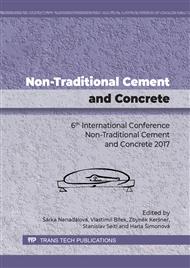p.111
p.116
p.120
p.127
p.131
p.135
p.144
p.148
p.152
The Effect of Zinc on the Portland Cement Hydration
Abstract:
Concrete is still the most commonly used building material. The main component of concrete is Portland cement. Due to increasing use of secondary products containing zinc, the amount of zinc in the clinker or in the secondary raw materials is increasing in recent years. Portland clinker can gain zinc from solid waste or tires which are widely used as a fuel for a burning in rotary kiln. In the case of secondary raw materials, zinc may be present in the primary material, where the manufacturing process leads to its removal and concentrating to "waste" which is used in the cement industry. The biggest problem with cement doped with zinc is the retardation of hydration and decreasing of mechanical properties. The main aim of this work is describing and evaluation of zinc effect on the course of Portland cement hydration.
Info:
Periodical:
Pages:
131-134
DOI:
Citation:
Online since:
January 2018
Authors:
Price:
Сopyright:
© 2018 Trans Tech Publications Ltd. All Rights Reserved
Share:
Citation:


